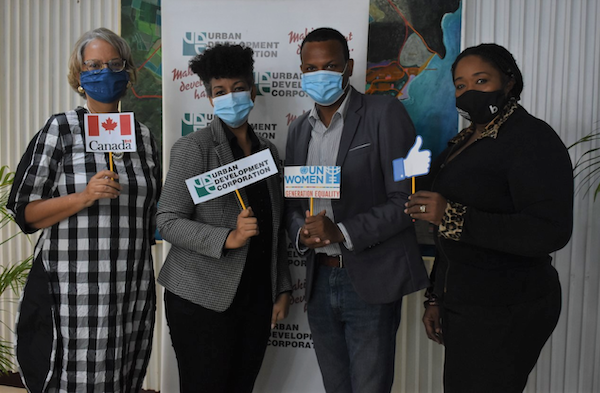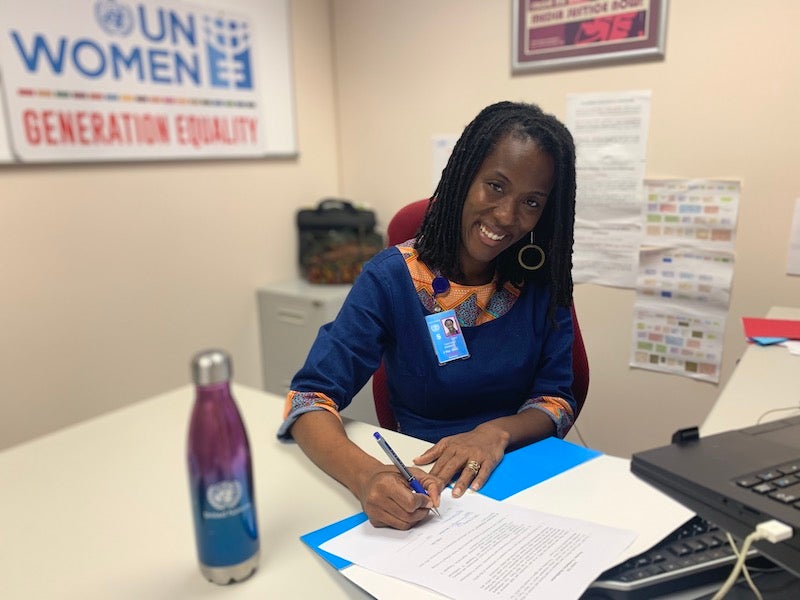Press Release - UDC and UN Women: A Partnership for Safety and Resilience
Date:

Kingston, 1 November 2020. In celebration of World Cities Day, UN Women and the Urban Development Corporation (UDC), Jamaica have joined together to make cities and public spaces in Jamaica safer and more resilient. Through a virtual signing of a Memorandum of Understanding (MOU) which took place on Friday 30 October, both entities have agreed to partner on several initiatives over the next two years that would contribute to an end to sexual harassment and violence in public spaces and promote equitable social, economic and political empowerment.
In his opening remarks UN Resident Coordinator to Jamaica Garry Connille stated,
“COVID-19 has presented unprecedented challenges for Jamaica and the region, this partnership for safety and resilience recognizes that hazards affect women and men differently and can make existing gender based as well as other relevant social and economic inequalities worse. The pervasive and heinous nature of gender-based violence in our countries makes it increasingly necessary to respond holistically and from the highest level.”
Women and girls experience and fear various types of sexual violence in public spaces, from sexual harassment to sexual assault including rape. Natural hazards such as COVID-19 and severe weather can contribute to an increased risk of violence. This, along with the economic shock resulting from the pandemic, has severely impacted the most vulnerable in society with women bearing the greatest burden. As COVID-19 continues to take a foothold in cities across the world, physical safety against gender-based violence as well as general public health safety is critical in order for cities to Build Back Better. The Women’s Health survey conducted by STATIN and UN Women highlighted that approximately 1 in 4 Jamaican women have experienced sexual harassment. UN Women’s Caribbean Status Of Women And Men Report: Productive Employment And Decent Work For All, shows that women in Jamaica already face higher rates of unemployment, are overrepresented in the informal sector and have a disproportionate responsibility for unpaid care work, thus, facing the greatest risk of falling into poverty.
To address these issues, the UDC and UN Women programme interventions will prioritize action towards the elimination of gender-based violence through facilitating freedom of movement and autonomous mobility, access to employment and livelihoods and freedom from violence against women in the public sphere. In particular, it will help craft vendors and women in craft to confront the additional challenges posed by COVID-19 through providing grants as part of an emergency relief programme, as well as building their skills in digital marketing and ICT. UDC staff will also benefit from UN Women’s technical advice and support to better understand and respond to the different needs of women and men in public spaces. Features of public spaces developed by the UDC such as the soon to be completed Closed Harbour Beach Park in Montego Bay will be optimized to make it safer, more sustainable and resilient, leading to an increased number of public spaces that are free from sexual harassment and other forms of sexual violence.
To mark this signing, the Honourable Pearnel Charles Jr., Minister of Housing, Urban Renewal, Environment and Climate Change shared,
“This is a critical step in Jamaica’s continued strategic development; it reflects our commitment to the important issue of women’s security and development in our country. An MOU such as this highlights the need for us as a country to support our women and their entrepreneurial endeavours. This is the type of collaborative support we need to drive resilience.”
UDC Group General Manager Heather Pinnock further elaborated stating,
“As our nation’s small businesses are facing an unprecedented disruption due to the COVID-19 pandemic, the UDC craft markets, in particular, face a myriad of difficulties. We recognize that women in the craft trade contribute significantly through the Tourism Sector and have had their livelihood impacted. This MOU will further support our female craft vendors, not only financially but will also engage and empower their development through skills training.”
UN Women MCO Caribbean Representative a.i. Tonni Brodber shared,
“Programmes such as this demonstrate how we can make SDG 17 on global partnership a reality that delivers for citizens and communities. We will be building on lessons learnt through UN Women’s Safe Cities Global Initiative, enhancing and adapting to our Caribbean reality to build back better for our women and girls, men and boys.”

Director, Strategic Project Development at UDC Richard Picart presented briefly on the Ocho Rios Market where over 70% of the persons who make a livelihood from the formal market spaces are women. The design approach to create crime free, gender-sensitive spaces that will improve walkability and develop a market model that fosters active and passive security while encouraging economic activity.
In closing, High Commissioner of Canada to Jamaica, Laurie Peters stated
“This is a timely initiative, with the right people at the table. I hope this initiative can be expanded and be a model for Jamaican cities to remain safe to all, but more importantly, addressing the vulnerabilities our women and girls experience.”